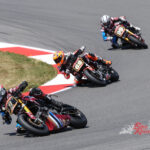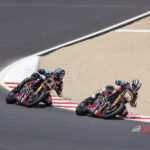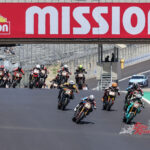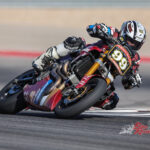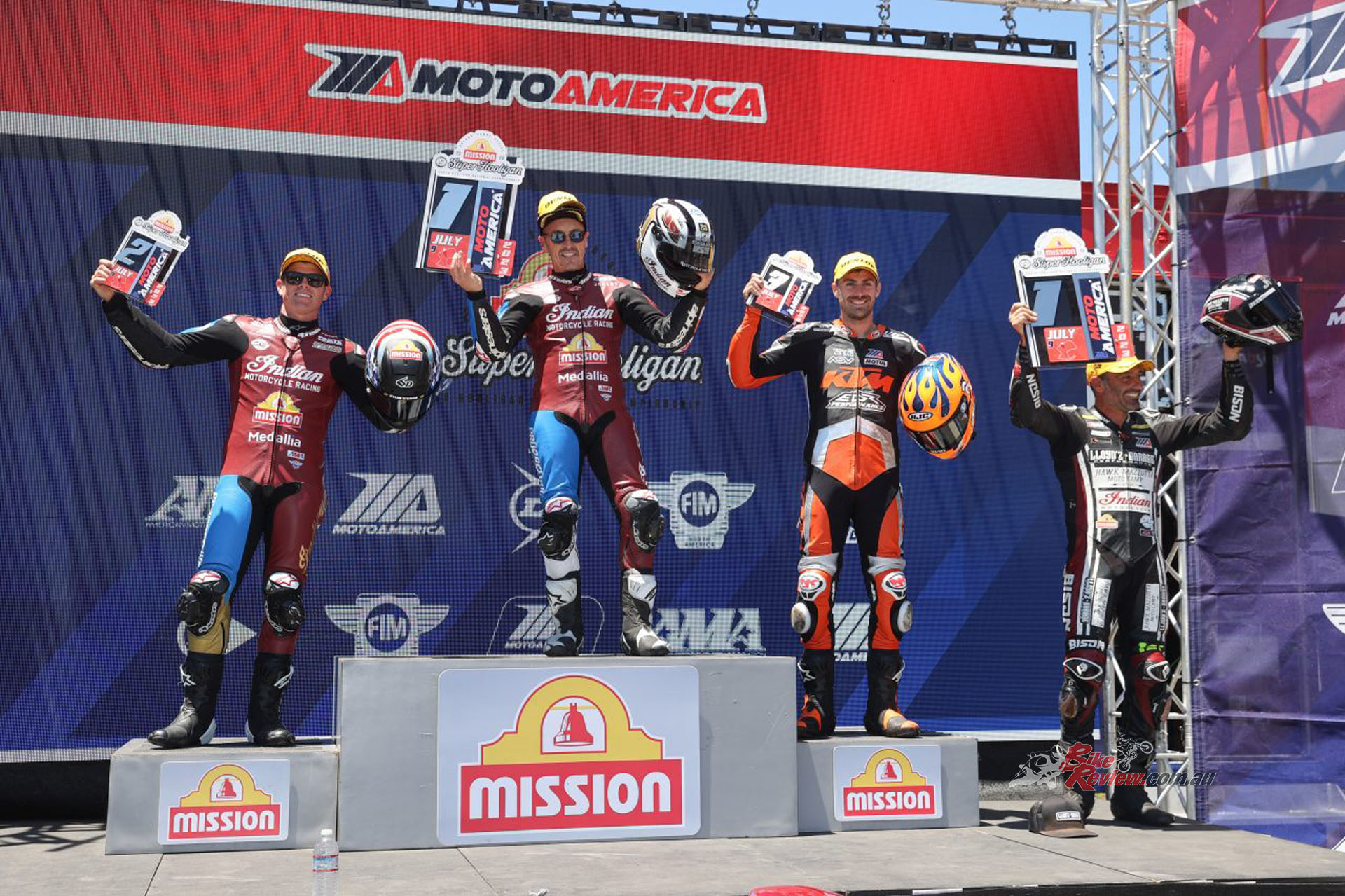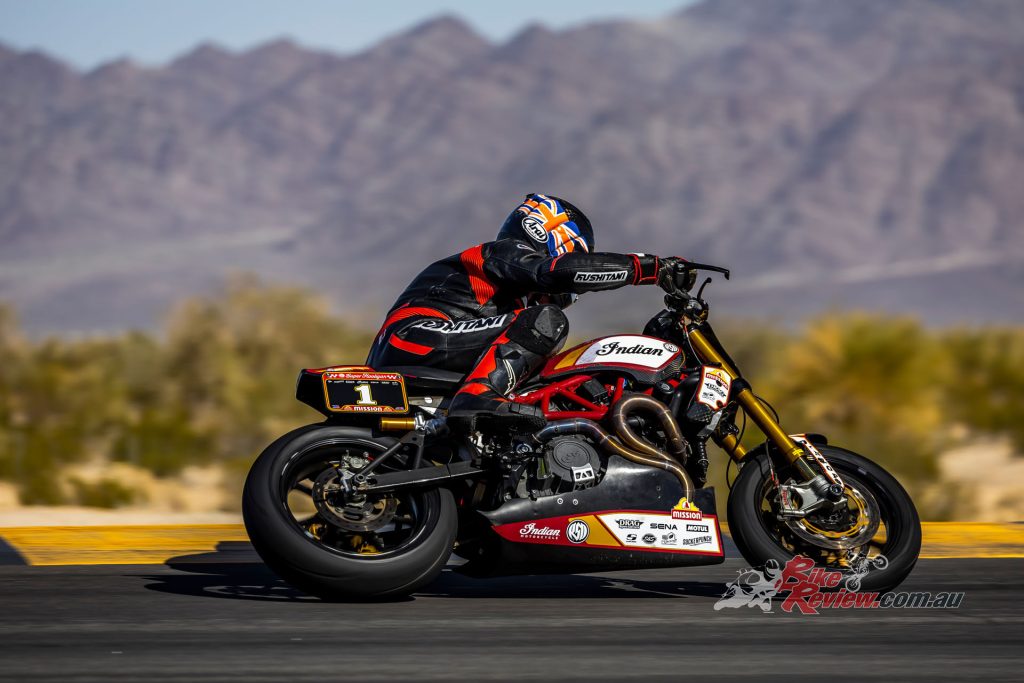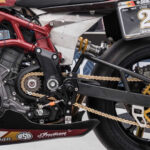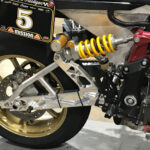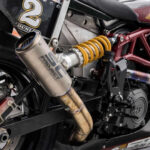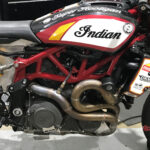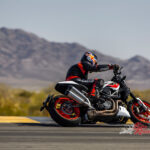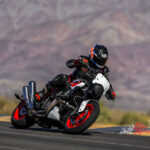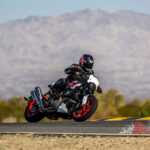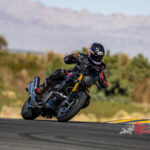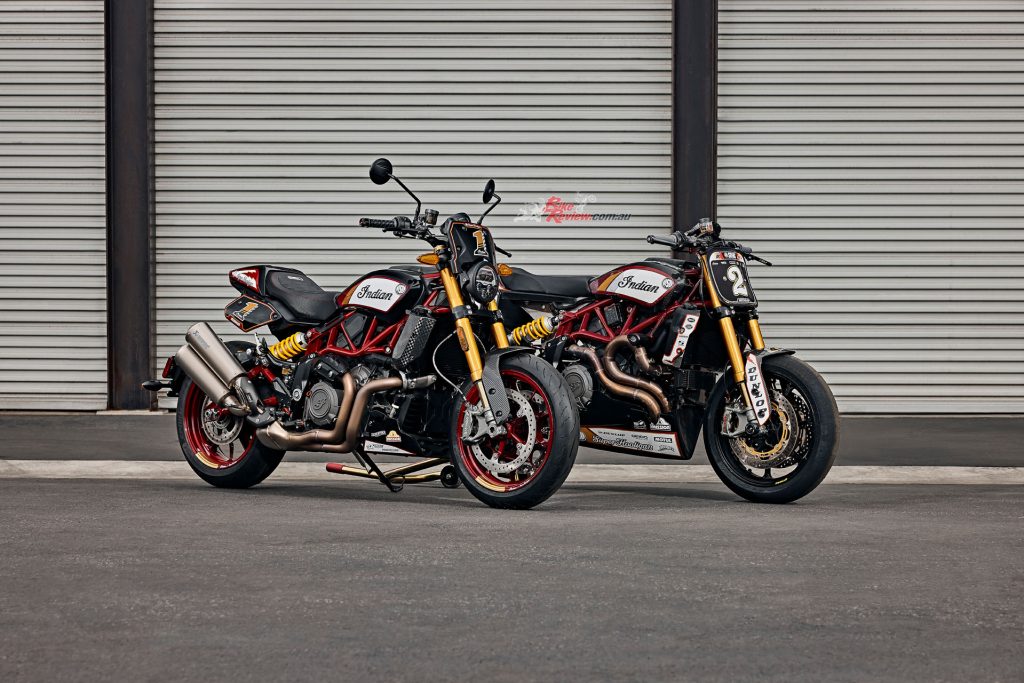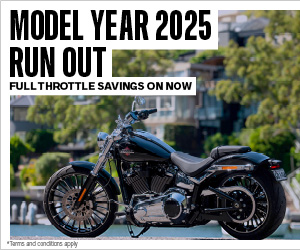Indian Motorcycle recently announced a limited edition 300-off 2024 version of its FTR 1200 model, inspired by its success in winning MotoAmerica’s Super Hooligan racing series in both 2022 and 2023, via the lead rider in its factory race team, Tyler O’Hara. We ride the racebike.
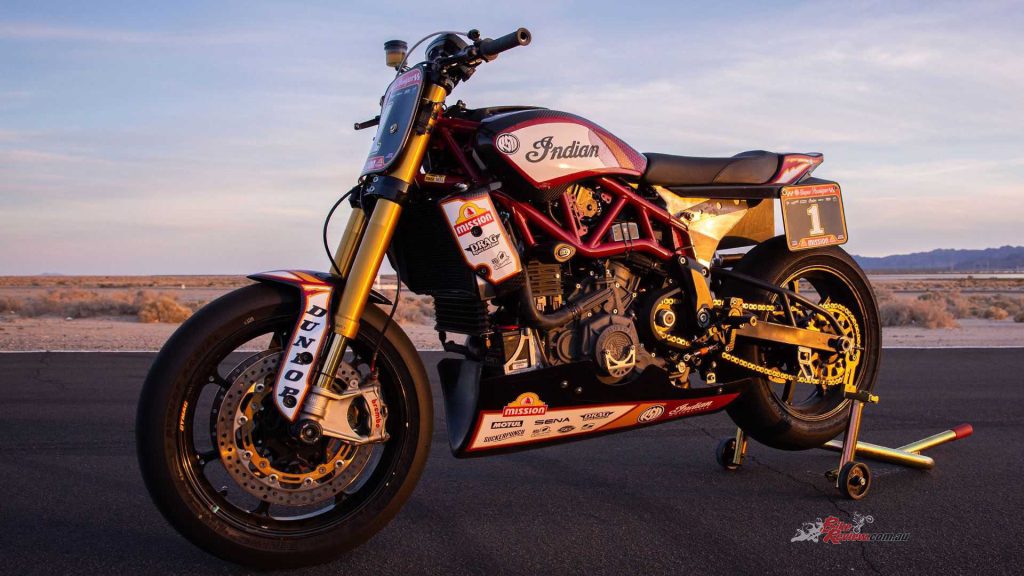
Tyler’s teammate Jeremy McWilliams finished second in the championship both years for a 1-2 Indian blitz of the points table. The new streetbike was created in collaboration with Indian’s longtime partner Roland Sands, who indeed created the Super Hooligans series, first on the dirt ovals, then from 2021 onwards in road racing. I was fortunate to be the only non-American in a small group of seven journalists invited to test ride O’Hara’s title-winning FTR racebike at a sunny but chilly Chuckwalla Raceway in Southern California. This is the bike from which the new Super Hooligan streetbike is directly derived, making this an exclusive look at the background to its creation.
Read our other Racer Tests here…
The ongoing expansion of Super Hooligan racing makes this a series on the way up, with Harley’s Pan American ADV bike now in contention for the podium (it already finished third in one race last year) as well as the only category in which electric bikes compete on even terms with ICE motorcycles, with Energica’s Stefano Mesa fourth overall in the 2023 championship after finishing second in one of the rounds. Moreover, this year will see three-cylinder bikes up to 900cc in capacity from Yamaha, Triumph and MV Agusta join BMW, KTM, Indian, Energica, Zero and Harley in the class hosting more different brands on the grid than any other in US road racing.
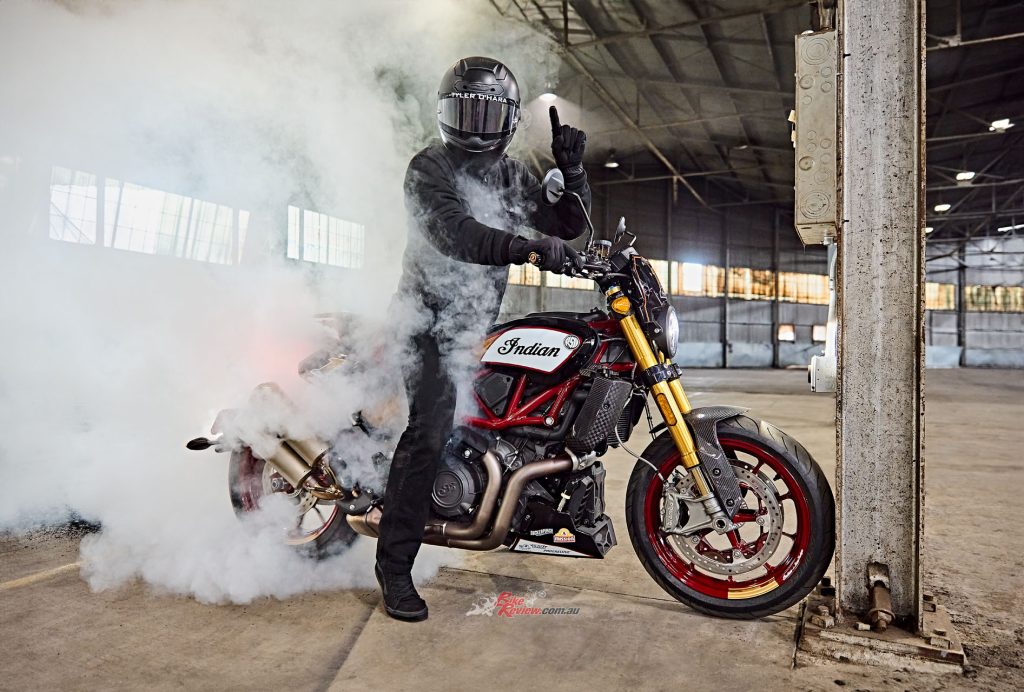
Road racing in the USA at National level is currently enjoying a purple patch, with MotoAmerica’s stacked grids for a wide variety of contrasting classes delivering nail-bitingly close, handlebar-clashing, all-action competition – even between rival teammates! The result has been a sharp spike in racetrack attendance by paying spectators, as well as in logins by online race fans – and especially so now that the century-old warfare between Indian and Harley on dirt ovals has finally been transposed to what in America is still termed by many such followers as ‘pavement racing’.
Three-time Australian Superbike champion Troy Herfoss, 37, joining the same-aged O’Hara in the factory Indian team for both classes…
For this two-wheeled equivalent of NASCAR has sold heaps of seats at MotoAmerica events, something that would never have happened without the presence on the race card of the KOTB/King Of The Baggers class and its junior sidekick – well, in engine displacement terms, at least – SHNC/Super Hooligan National Championship racing. Between them, the two categories are generating hundreds of millions of online impressions every year, and on YouTube, together they’re fourth in terms of engagement behind Formula 1, MotoGP and NASCAR – they’re even ahead of Supercross!
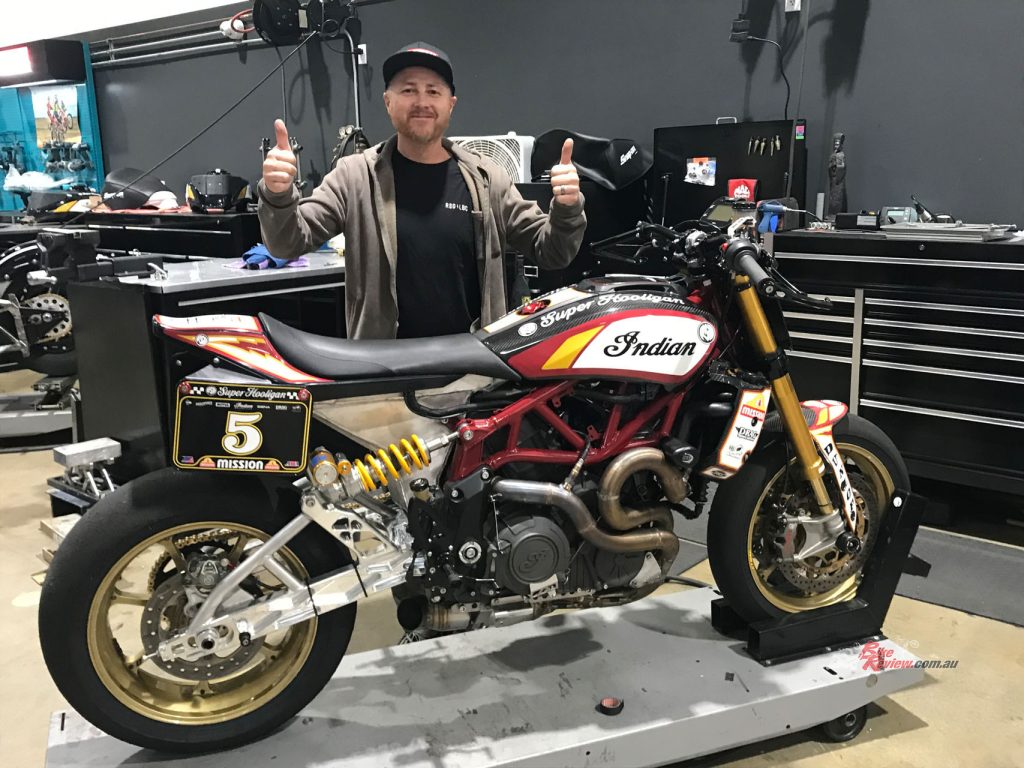
Both categories were essentially the creation of the fusion king of Custom cool, former AMA 250GP road racing champion turned trend-setting designer Roland Sands. He’s justly acclaimed as the leading exponent of the crossover culture between choppers and racebikes which so many other designers have since picked up on, moving the two-wheeled Custom scene from a backstreet art form to a mainstream element of modern-day motorcycle culture, with bikes that steer and go and stop and handle better than OK in real world riding, besides being a blank canvas for designers to express themselves on.

“I like the idea of racing things that were never meant to be raced,” says Roland, 49. “Baggers and Hooligans came at MotoAmerica from different directions, but I guess RSD [Roland Sands Design] was involved in making them both happen, from building early days Bagger racers back in 2020 as a kind of Covid peace dividend, to getting the Super Hooligans up and running. In fact, the whole Super Hooligan thing came long before that out of dirt track, when we’d put a 21-inch front tyre on a Harley Softtail, and go ride the s**t out of it at Costa Mesa Speedway’s dirt oval. This was the most fun that I have personally ever had on two wheels, still to this day! So since 2017 we’ve had a Super Hooligan National Championship dirt series, but then we took what was originally this kind of low brow flat track theme, and with Indian’s support we turned it into a road racing category for bikes that would never normally see the inside of a race track.”
So starting in 2022 with a four-round Super Hooligan National Championship that led to an eight-race series in 2023, the Mission Foods-sponsored series expands this coming season to 10 rounds of SHNC road racing at five events staged across the USA. The season kicks off in March on Daytona Speedway’s high bankings, before heading on to The Ridge in Washington State, Laguna Seca in California, then Mid-Ohio, ending with a grand finale in September at COTT/Circuit of The Americas in Austin, Texas.
2024’s defending champion, Indian factory rider Tyler O’Hara, has won both the MotoAmerica Super Hooligan road race series run so far in 2022-23 on his S&S-tuned FTR, with former teammate and ex-GP great Jeremy McWilliams runner-up last year after the duo took lumps out of each other in the final turn at the COTA decider last September. Jezza has now decided that with his 60th birthday coming up on April 6th maybe it’s time to step back from full-time factory road racing.

But there’ll still be a major international element in both SHNC and KOTB racing this year, with reigning three-time Australian Superbike champion Troy Herfoss, 37, joining the same-aged O’Hara in the factory Indian team for both classes, and after winning the 2008 AMA Supermoto Championship, this particular Aussie is well versed in racing in the USA.
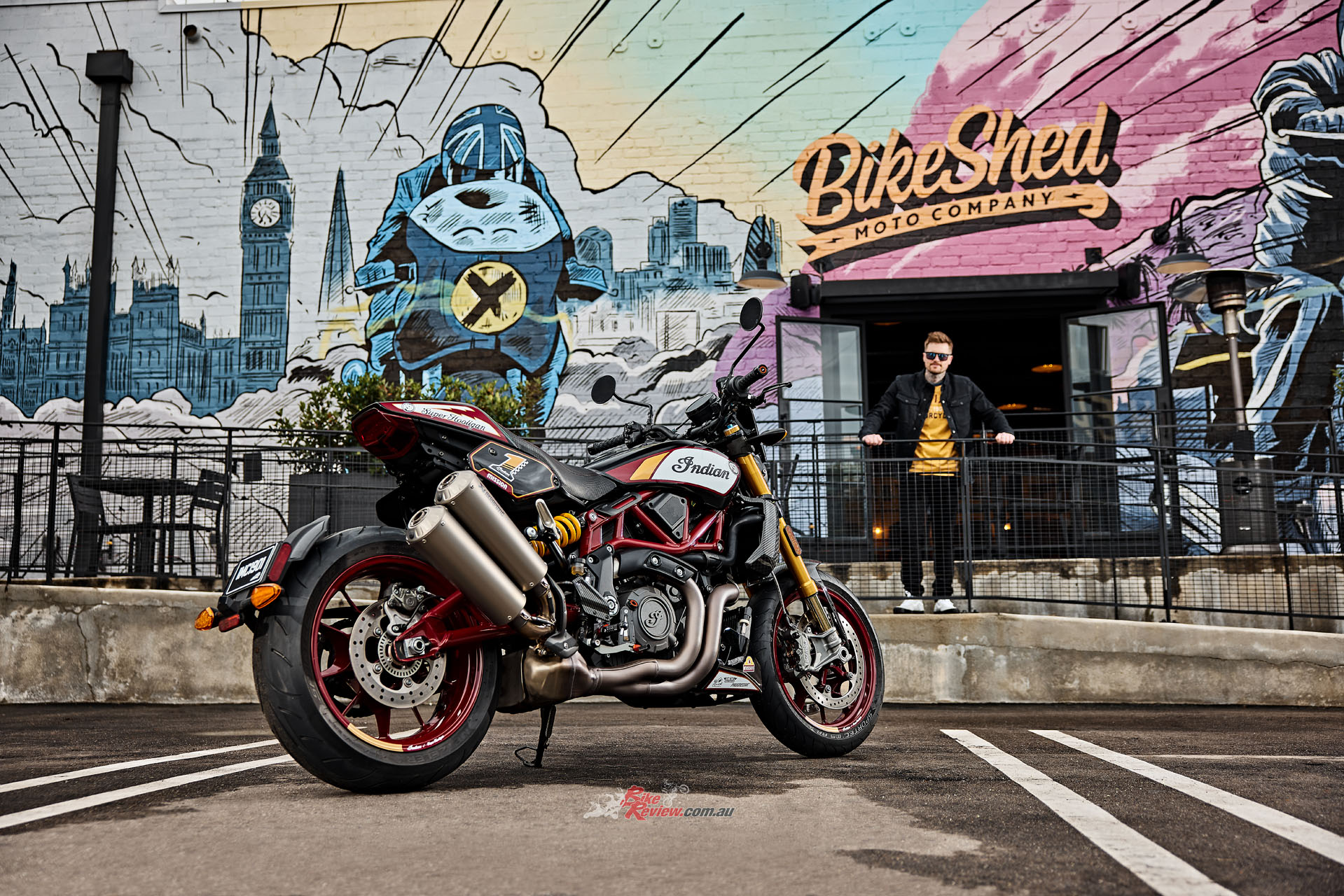
Indian Motorcycle’s involvement as the SHNC series’ title sponsor has extended to not only winning two championship crowns with race developed versions of its FTR1200 60° V-twin hotrod, but to marking those victories by teaming up with RSD/Roland Sands Design to make a limited-edition Super Hooligan streetbike inspired by the run-what-ya-brung race series. The so-called FTR x RSD Super Hooligan just unveiled for 2024 is built on the Indian FTR R Carbon platform, and will be limited to only 300 units for global sale, 150 of them in the USA with prices starting at $28,995 AUD, and each bike bearing an individually numbered commemorative tank console.
It features fully adjustable Ohlins suspension with an upside-down 43mm fork and rear cantilever shock. Also included are twin 320mm Brembo front brakes, a four-inch touchscreen display with Bluetooth connectivity, and an Akrapovič silencer and heat shield, plus Gilles Tooling adjustable rear sets, oil cap, radiator cap, and bar-end weights. The bike features Black Metallic bodywork with Super Hooligan race graphics, a red frame with matching wheels with gold accents, and Indian Motorcycle Racing’s No.1 Championship logo on the front and side number plates. There are more logos from team sponsors on the rear seat cowl, and additional graphics for the radiator shroud, front fender, and front forks are available as options.
Check out the Indian FTR x RSD Super Hooligan Video
“Super Hooligan has always been about more than just racing,” says Roland Sands “It’s about pushing boundaries and having a blast riding motorcycles with your friends. Far from the full-fairing machines you normally see on the racetrack, a Super Hooligan bike has effortless attitude and a custom aesthetic, with an exposed powertrain. So when Indian Motorcycle approached us to co-design an Indian FTR for consumers, it was a natural fit and something we’re very excited to be a part of.”
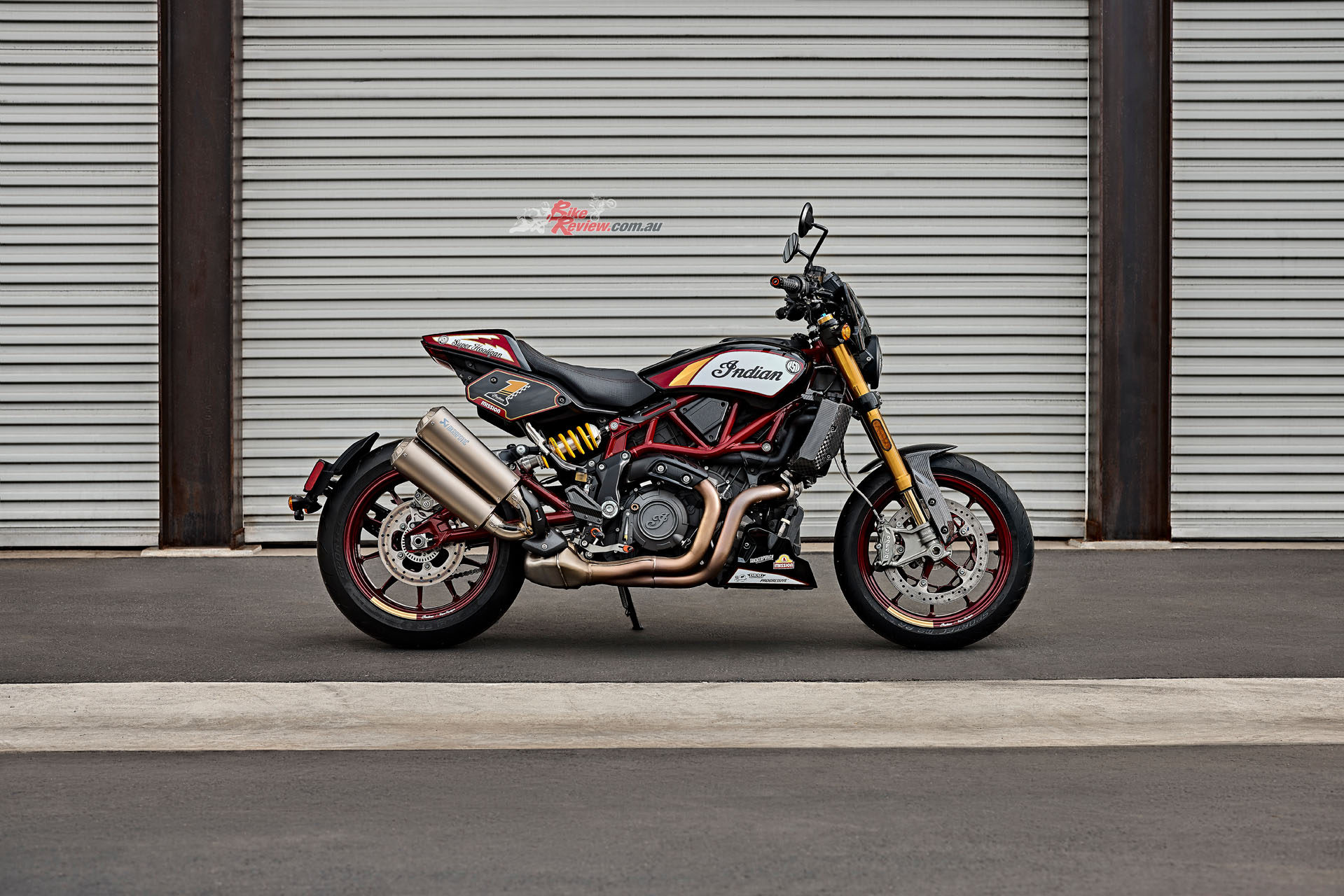
SHNC rules are deliberately kept vague, so as to open the class up to as wide a variety as possible of motorcycles that were never really meant to be raced, albeit may have sporty pretensions. They must use stock frames, have no bodywork and last season liquid-cooled bikes couldn’t weigh less than 397lb/180kg in the state they finished a race or qualifying, including all remaining liquids (350lb/159kg for air-cooled V-twins, which are also permitted to modify the frames). That’s now been lowered to 377lb/171kg for waterpumpers in 2023.
Minimum displacement is 750cc, there’s no upper limit, but maximum horsepower is 125bhp, and for added spice, electric motorcycles are also eligible with the same minimum weight limits as the liquid-cooled twins. Good luck in getting an e-bike to scale anywhere near that figure with sufficient battery capacity to be competitive at the end of even a seven-lap Laguna Seca race, let alone a six-lapper on the Daytona bankings! Now for 2024 to broaden the lineup even further, three-cylinder bikes with a maximum displacement of 900cc are also included. Welcome to Super Hooligan racing, Yamaha, MV Agusta and Triumph!
In fact, 2023 saw the lineup of bikes comprising the grid considerably more variegated than in 2022, with the so-far dominant Indian FTR’s supremacy now seriously threatened by the KTM 890, joined by the BMW RnineT, and various Ducati V-twin models. But a key player was the more competitive of the two electric motorcycles on the grid (a Zero was the other) – Stefano Mesa’s Italian Energica, which scored the first-ever e-podium in Open class racing against ICE rivals with second place in Race 1 at COTA, after McWilliams bit the dust in a last-corner confrontation with teammate O’Hara.
Mesa finished fourth in the final points table, while third overall with five rostrum finishes putting him just four points behind McWilliams at season’s end was Andy DiBrino on a self-sponsored KTM 890, with one of those a rare non-Indian race victory at The Ridge, when both O’Hara and McWilliams were disqualified for an illegal handlebar shape/height. Yes, really – Super Hooligan Technical Regulations state that “No clip-ons that have been converted to top-mounted handlebars are permitted. The end of the handlebar must sit above the top plane of the upper triple-clamp.”
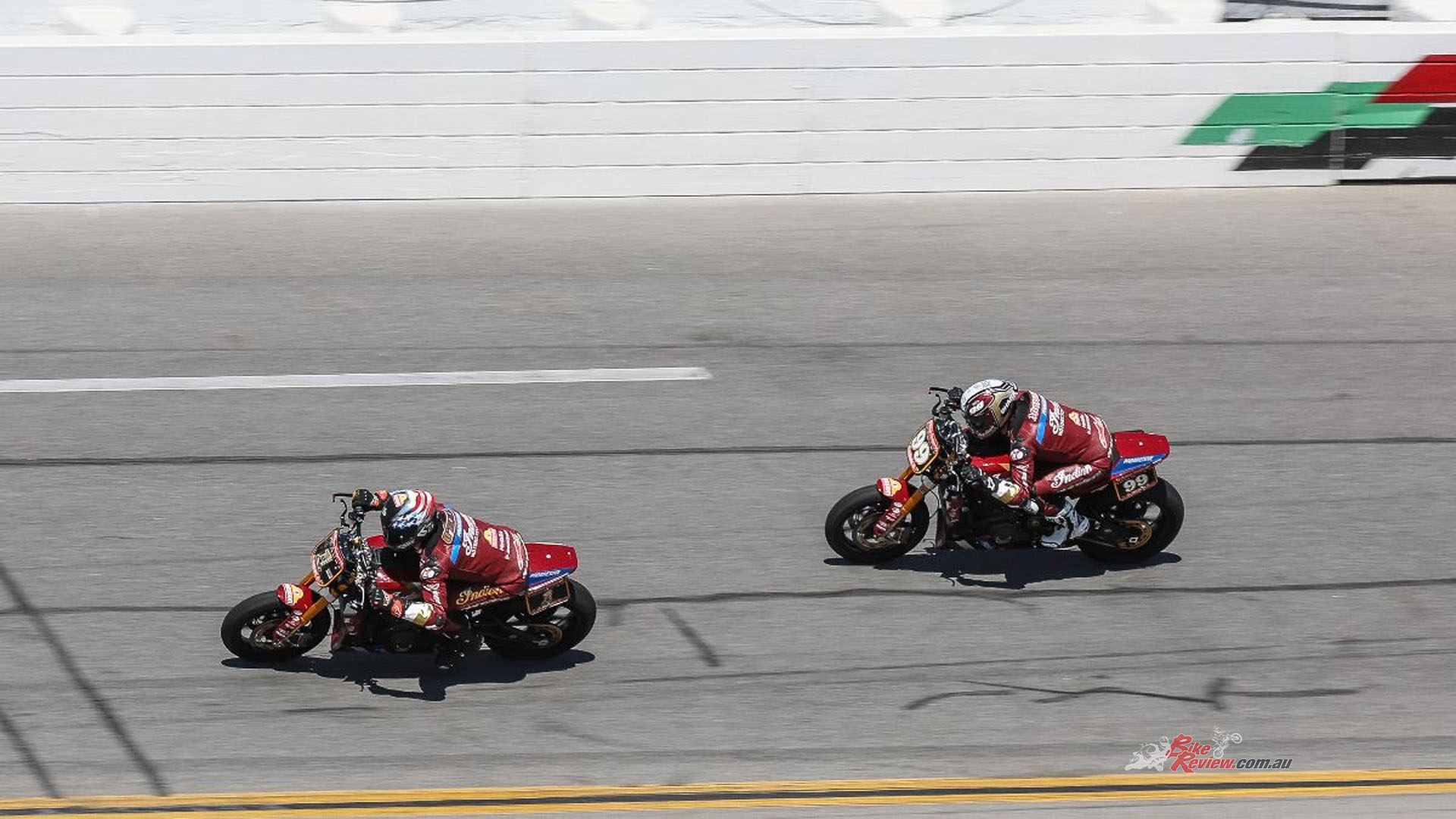
That protest was filed by H-D rider Cory West’s Team Saddlemen, entrant of the only Harley-Davidson on the grid, an eight-valve liquid-cooled Revolution Max-powered Pan America ADV which must adopt two velocity stacks and the more restrictive airbox of the Sportster S to keep a lid on its stock 150bhp output. “If there was one brand we wanted to add to the mix, it was Harley,” says series godfather Roland Sands. “Obviously, they bring a massive audience, and it’s also the one place where they can improve the Pan America platform in a serious way.
The only way to really expand what your platform is capable of is if you go racing, and we’re seeing that with Indian and the FTR, and on the Bagger side with Harley and the Road Glide, and Indian and the Challenger, and now Harley is trying to achieve than in Super Hooligan with the Pan America. Harley versus Indian, air-cooled versus water-cooled, electric versus ICE – I want to see all different styles of bikes racing together.” And that’s indeed what’s happening…..
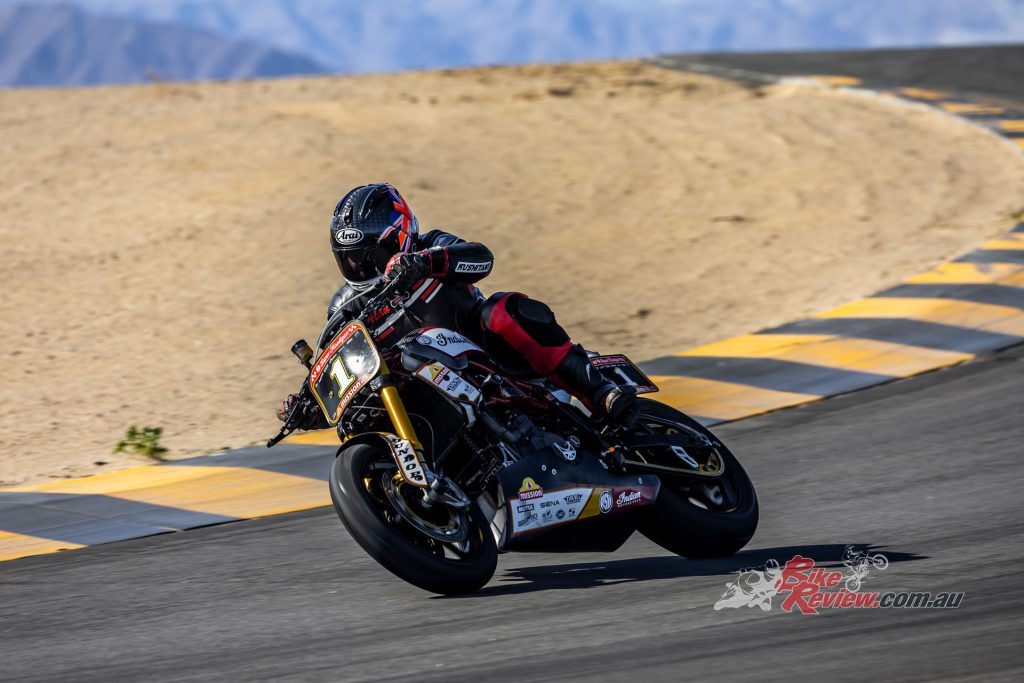
THE RIDE
For an idea of what Troy Herfoss can likely expect to find awaiting him in contesting a catch-all category that doesn’t exist outside America, I was given the keys of Tyler O’Hara’s title-winning Indian FTR for what was supposed to be just five laps of Southern California’s 17-turn 2.68mi/4.31km Chuckwalla Raceway on the edge of the Mojave Desert, where on a bitterly cold but sunny February day I was invited to be the only non-Yank in a small group of journos invited to sample the bike. But I guess the flagman must have got distracted, since he forgot to wave me off until I’d done seven laps on the factory racer. Look, every little bit helps!
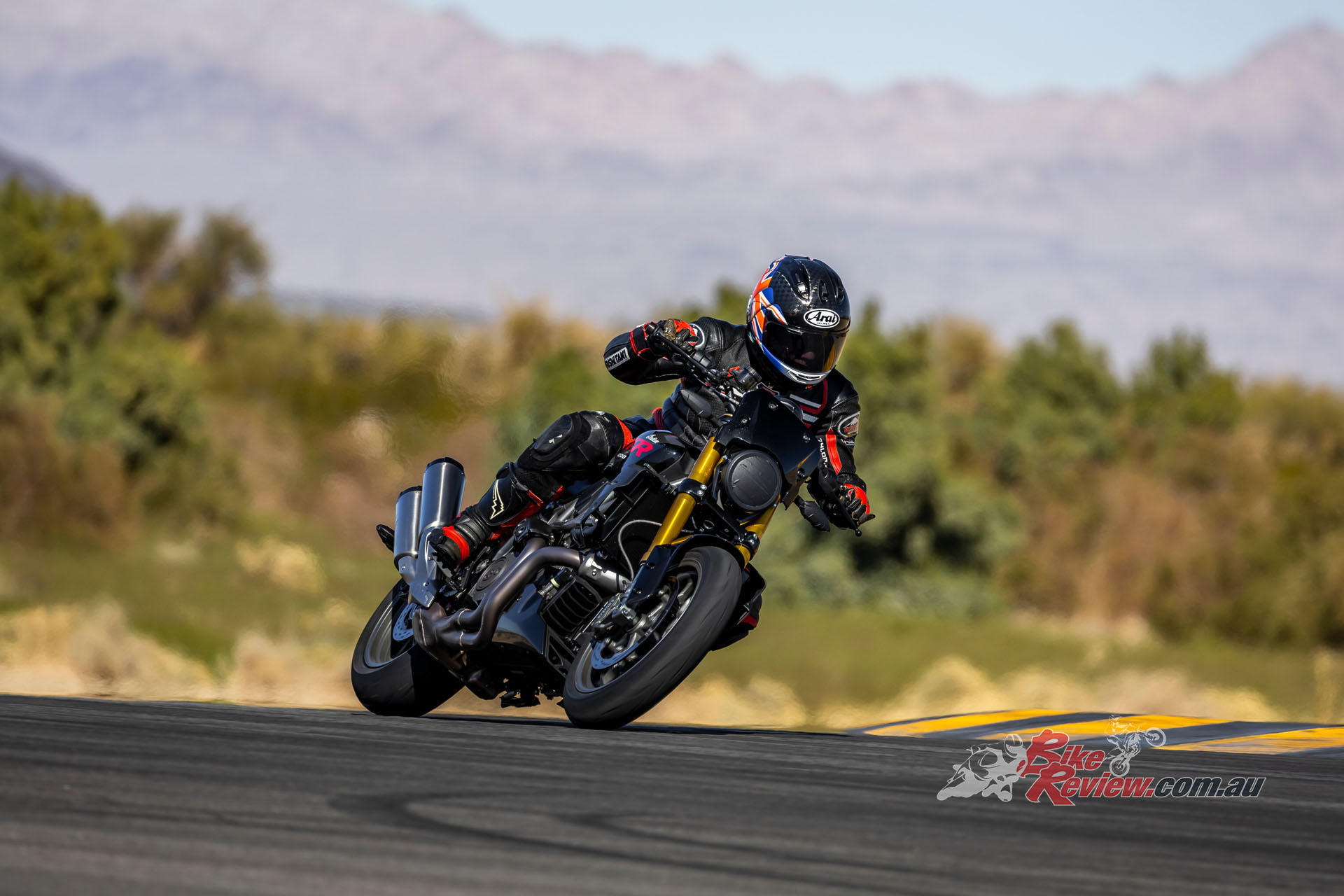
That came after 10 laps on a stock Indian FTR Sport, equipped with a flyscreen, a chin fairing, and a seat cowl, as well as 17-inch wheels front and rear rather than the 19/18-inch combo the FTR debuted with five years ago in 2019. This was the first time I’d ever ridden one of these dirt track-derived Indian V-twins on a tarmac racetrack, and besides providing ideal training wheels to learn Chuckwalla’s fast but featureless twists and turns, it also reminded me how much fun these Indians are to ride in something approaching anger, even if the lower-set pegs will readily drag in turns thanks to the good grip from the Dunlop tyres. But the sportier steering geometry provided by the smaller wheels helps provide added agility, helped by the high, wide handlebar, while the stock FTR’s relatively long 60in/1524mm wheelbase delivers good stability
“As a 20-year veteran of ProTwins competition, this is my kind of motorcycle”…
The footrests will touch down because the FTR’s riding position is relatively spacious as befits an all-statures streetbike, but switching swiftly to the RSD-built S&S-tuned factory race version of the same bike revealed that the already shorter Tyler O’Hara likes a super close-coupled riding position which was quite cramped for me in measuring 180cm/5’10” tall. Plus the super-flat Pro Taper handlebar stipulated by O’Hara for his bike meant I had to reach forward to grasp it, thus lowering my torso for a more aerodynamic stance which nevertheless felt pretty uncomfortable.
Ironically, the one thing I’d have liked to help me stay in place under acceleration would have been a bum pad at the rear of the long, flat, raised Saddlemen seat that could have stopped me having to hold on so tight to that low, flat handlebar under the pretty vivid acceleration delivered by the tuned 1203cc 60° V-twin motor.
For swapping the stock FTR Sport for the SH racer had meant going from a sporty streetlegal café racer hotrod to a full race Battle of the Twins bike which, despite its nominal 125bhp power ceiling, would surely give a good account of itself locked in battle with many more potent twin-cylinder racers. As a 20-year veteran of ProTwins competition, this is my kind of motorcycle. The blueprinted engine is otherwise stock, apart from race camshafts and a less restrictive airbox for better breathing.
But there’s a freer-flowing under-engine race exhaust concocted by RSD and S&S Cycle that’s seemingly devoid of any silencing properties other than those that deliver increased performance, resulting in a stirring cacophony of the sound of thunder, interspersed with relatively frequent pistol-cracking backfires on the overrun under braking into a turn. Some other Indian Super Hooligans were fitted with a much quieter Italian-made SC-Project pipe with a large titanium silencer, but not the test bike, which appears to be even skinnier and minimalist when you ride it without the bulk of a silencer.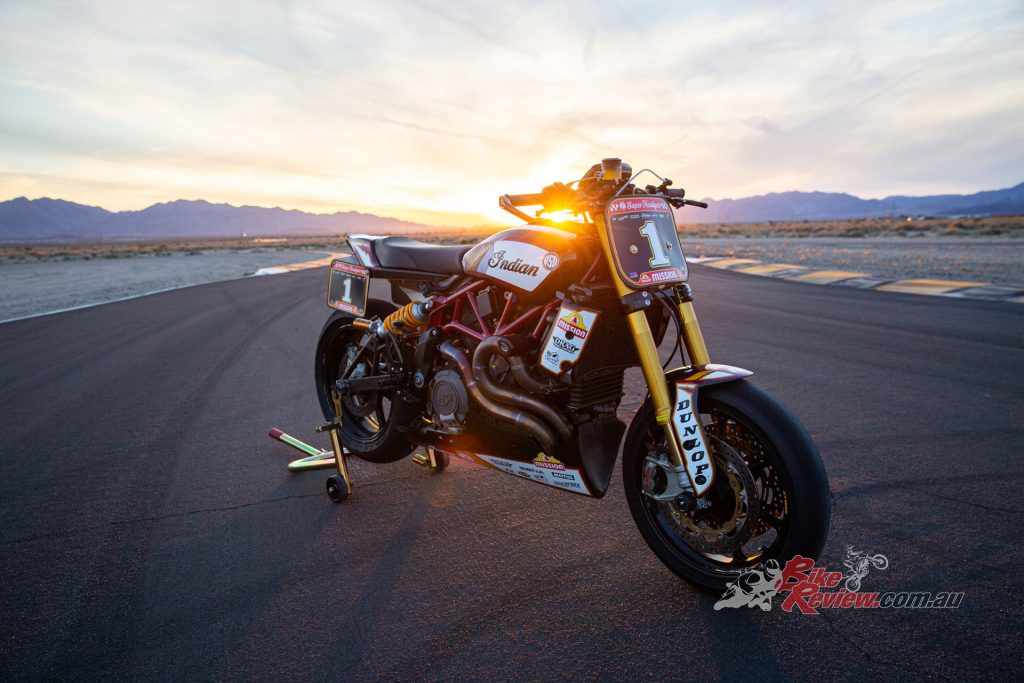
Despite its tendency to run on into turns after you’ve closed the throttle, you soon come to terms with the backfiring, which is presumably caused by unburnt fuel in the combustion chamber on a motor too rich for ambient desert conditions. But on the other side of a given turn the motor’s huge eagerness to rev made it seem unlikely that the crank hasn’t been lightened compared to the stock FTR Sport I’d just been riding.
“Compared to its street-legal cousin, the Hooligan racer had a much more vivid pickup from a closed throttle”…
Which it hadn’t – but the free-breathing motor with a single injector per cylinder and twin 60mm Mikuni throttle-bodies makes the most of the extra hit of top end power seemingly delivered via the race cams to broaden the strongest part of the powerband, and the way Lloydz Garage has reflashed the stock Polaris ECU has surely also helped with this. It was all sufficient to propel Jeremy McWilliams on an identical bike through the Daytona speed trap at 166 mph/267km/h last year – some going for an unfaired 1203cc V-twin, and a strictly subversive turn of speed for a bike that was never conceived as being a road racer.
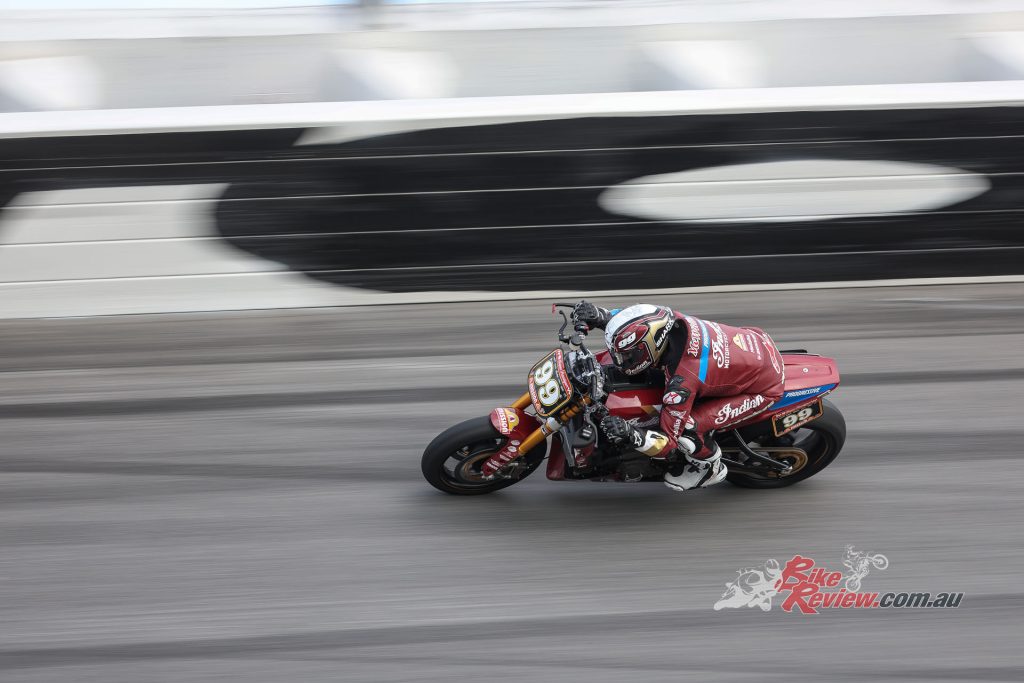
Yet that hasn’t been achieved at the cost of sacrificing the Indian motor’s wide spread of torque, which made it a forgiving ride as I completed my Chuckwalla learning cycle. It pulled well from as low as 3,000 revs before coming on strong at 7,000rpm in a punchy way which the standard FTR Sport hadn’t done nearly as emphatically, before hitting the soft-action rev-limiter at 9,500rpm.
Keeping it revving that high was easily done via the stock six-speed gearbox whose ratios suit the bike well – although the two-way IRC race-pattern powershifter was a disappointment, with a harsh change that needed refinement, plus the actual lever itself had a sort of kink in it which prevented me getting at the pedal, so I had to shift gear on the kink. Easily fixed if it were my bike, I’m sure. But compared to its street-legal cousin, the Hooligan racer had a much more vivid pickup from a closed throttle, sending the front wheel in the air exiting Chuckwalla’s slower turns in second gear – all accompanied by the raucous racket from that under-motor exhaust.
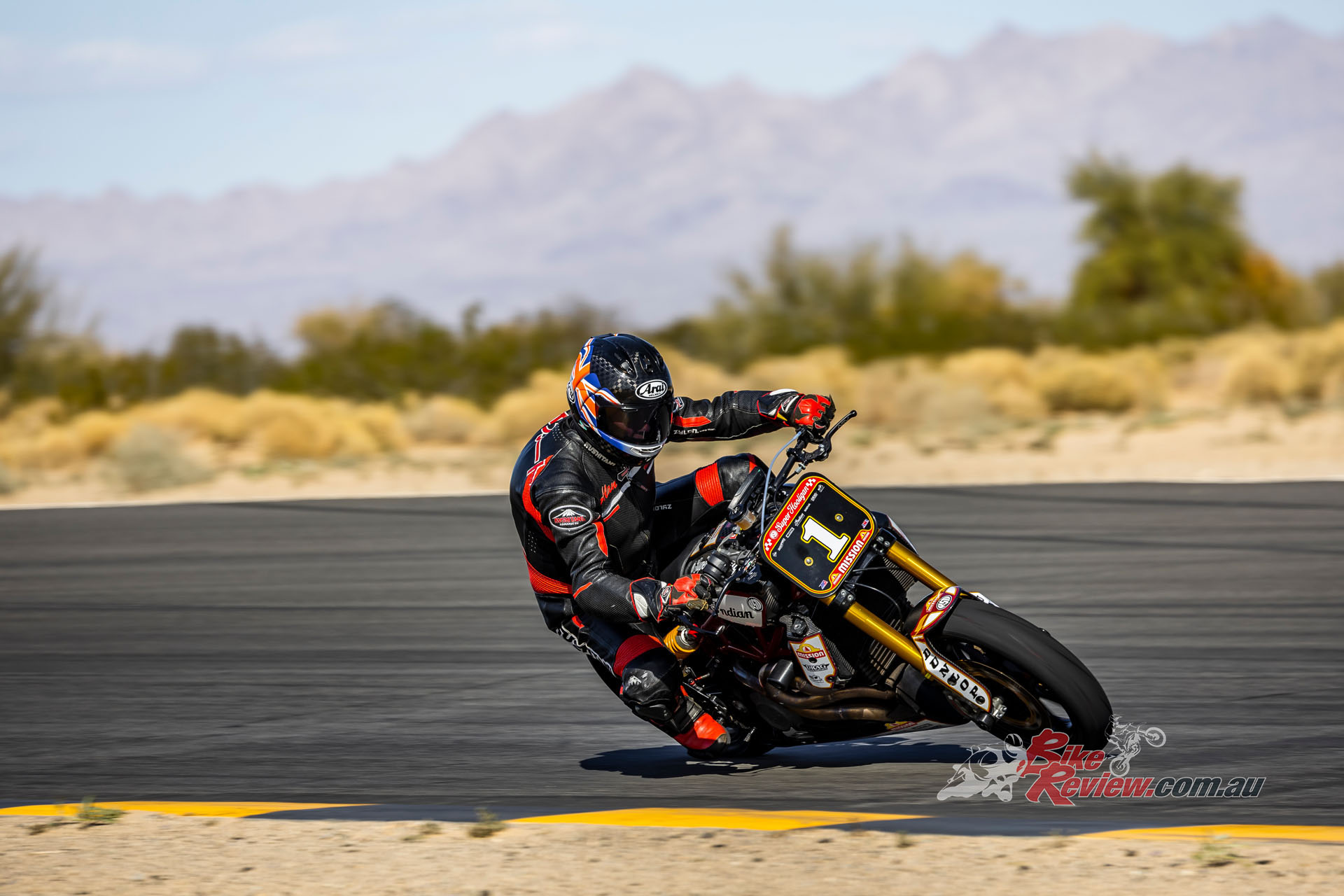
In compliance with SHNC rules, Indian has retained the stock FTR’s main frame and swingarm plates, but has fitted a 75mm shorter RSD-designed Trac Dynamics chrome-moly swingarm to reduce the wheelbase to 1450mm in pursuit of more agile handling. Coupled with the unchanged stock 25.7-degree head angle with a special set of triple-clamps delivering what bike-builder Roland Sands confirmed was 121mm of trail, that nimble yet stable steering was aided by the reduced rotational inertia and unsprung mass of the twin lightweight Dymag UP7X forged aluminium wheels which the Super Hooligan racer carries.
The rear wheel is a relatively narrow 5.50in item bearing a 180/60-17 Dunlop KR441 slick, so it’s not over-tyred at the rear, a common fault among those who think bigger is best, but don’t consider the reduced drag a fatter rear tyre brings in its wake, reducing top speed and also making it harder to shift the bike from side to side. That absolutely wasn’t a problem with the Indian Hooligan, which made nifty work of Chuckwalla’s tighter turns, thanks partly to the handlebar which even in fully legal form delivered a welcome degree of leverage in changing direction. It’s even sweeter-steering and sharper-handling than the FTR Sport streetbike.

Having moved weight rearwards via the shorter swingarm and the larger RSD aluminium fuel cell extending rearwards under the seat after Tyler O’Hara ran out of gas at Daytona in 2022, Indian had made every effort to increase front-end weight bias, from lengthening the cantilever Ohlins rear shock by 20mm to lifting the rider further up via the raised Saddlemen seat. This also provided extra clearance when cornering at extreme lean angles.

But even with fully adjustable Ohlins front suspension that’s supposedly sourced from the FTR R Carbon version of the model – though I’m sure the fork legs had heavily modified full-race internals – there was pronounced front-end chatter from the Indian racer at full lean in a couple of Chuckwalla’s faster turns. Unfortunately, with just seven laps allocated to me I couldn’t begin to try to resolve that, but for sure Messrs. O’Hara and McWilliams didn’t race the bike like that – though I’m sure they didn’t have to cope with the backfire, either. It would have been nice to have more time to spend getting the fuelling and suspension set up ideally on a bike that by winning seven of the eight 2023 Super Hooligan championship rounds was amply demonstrated to be the class paragon.
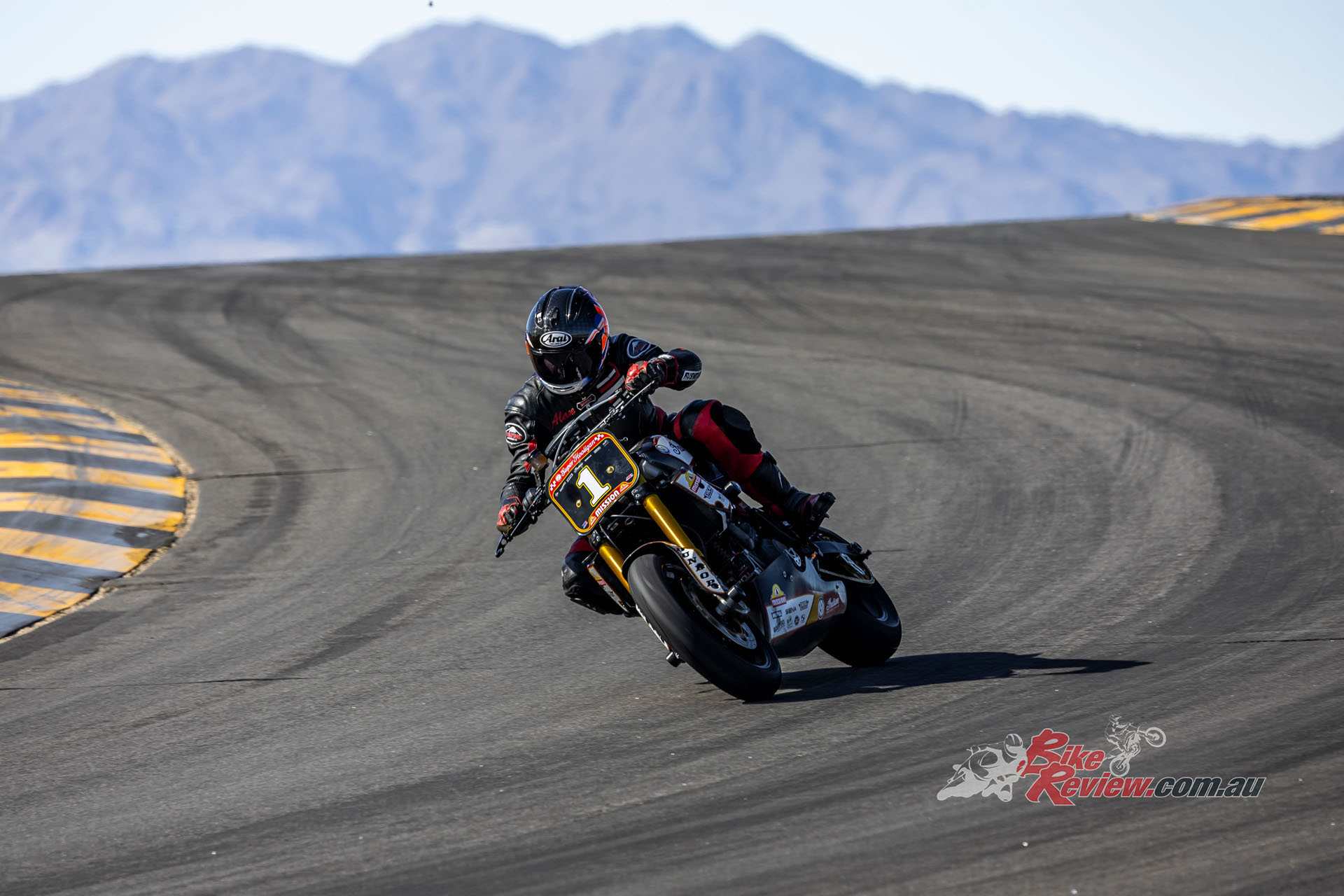
No complaints about the Indian’s braking, though, and there was much less weight transfer than on the stock FTR Sport under the super stopping power provided by the Brembo brake package, via twin 320mm steel discs with four-piston Stylema M4 Monoblock radial calipers, a Corsa Corta 17mm master cylinder and custom Spiegler metal brake lines. Braking hard for the tight second-gear hillside chicane while leaned over to the left saw the Indian hold a tight line leading into the crest-top entry, and it was forgiving, too, without insisting on sitting up and heading for Mexico if I miscalculated my entry speed when cranked over for a fast sweeper, and touched the front brake lever to lose a little momentum.
“The 300 owners of the streetlegal replicas of this racer have a treat in store”…
Weighing 429lb/196kg with oil/water, no fuel and bereft of street equipment, the Indian racer is about 90lb/40kg lighter than the FTR Sport, so there’s that much less to stop. But the way the Brembo package delivers such ferocious but usable stopping power is totally addictive – and effective. As indeed is the whole motorcycle. Indian has delivered a contradiction in terms – a well-behaved Hooligan of a motorcycle, that’s a thrilling real world ride. The 300 owners of the streetlegal replicas of this racer have a treat in store.
INDIAN FTR SUPER HOOLIGAN SPECIFICATIONS
Engine
Liquid-cooled 60º four-stroke liquid-cooled DOHC, four-valve per cylinder V-Twin, gear driven counterbalaner, 102 x 73.6mm bore x stroke, 12.5:1 compression, 1203cc (73ci), closed loop EFI with stock Polaris ECU reflashed by Lloydz Garage, single injector per cylinder, 2 x 60mm Mikuni throttle-bodies, six-speed gearbox with gear primary drive, wet multiplate slipper clutch.
Chassis
Tubular steel trellis frame with engine used as stressed member, fully adjustable 43mm Ohlins inverted forks, 120mm travel, Trac Dynamics chrome-moly steel swingarm with fully adjustable Ohlins TTX cantilever shock, 120mm travel, 1450mm wheelbase, 25.7º rake, 121mm trail, dual 320mm Brembo steel rotors, four-piston Brembo Stylema M4 calipers, Brembo Corsa Corta 17mm master-cylinder, Spiegler stainless-steel brake lines (f), single 254mm Brembo floating steel rear disc with two-piston Brembo caliper, Dymag UP7X forged alloy wheels (3.50 x 17in, 5.50 x 17in), Dunlop KR448/KR441 slick tyres.
Performance
Top Speed: 267km/h (McWilliams, Daytona 2023), Weight: 196kg oil/water no fuel, Power: 125hp@8250rpm, 120Nm@5900rpm.




